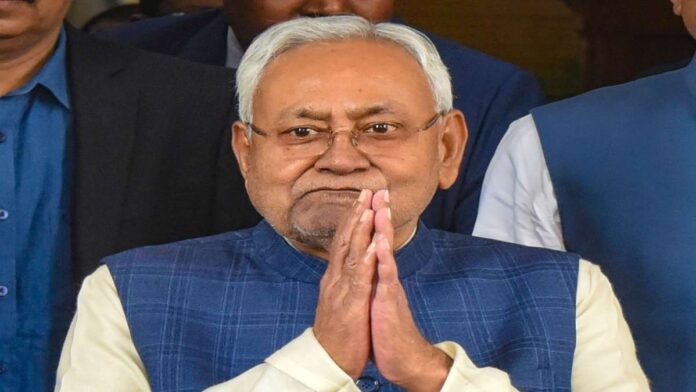By Sami Ahmad
PATNA—Nitish Kumar’s Janata Dal (United) silently met the former president Ramnath Kovind-led High Level Committee and handed over JD(U)’s support letter. It was revealed by JD(U)’s Parliamentary Board’s leader Rajiv Ranjan Singh alias Lalan Singh on Saturday.
Though Nitish Kumar and his party JD(U) try to take different stands on certain issues, there is a trend of backtracking and toeing the line of the Bharatiya Janta Party. It can be seen from JD(U)’s changing stand on key issues like Article 370 to CAA, and now to One Nation, One Election.
Nitish Kumar joined hands with the BJP as the National Democratic Alliance (NDA) partner in 1996 and for long maintained its different stand but compromised when the real occasion came.
It needs to be noted that the JD(U) did not make its stand clear when it was with the Grand Alliance (GA) and announced its formal support to One Nation, One Election only after dumping the GA.
Though Lalan Singh claimed that JD(U)’s chief Nitish Kumar was always in favour of One Nation, One Election, no such announcement was made while Nitish Kumar was in the INDIA bloc. It is yet another sign of toeing the BJP line by Nitish Kumar.
Lalan Singh added one rider to this support to One Nation, One Election that the local bodies’ election should not be a part of it.
JD(U) changed its stand on the Citizenship Amendment Bill (CAB) which later became the Citizenship Amendment Act (CAA). The then party leader Prashant Kishor and Pavan Verma had shown their unhappiness over this issue and later they were expelled from the JD(U). In January 2019, JD(U) had opposed CAB and even claimed that because of its opposition, the government did not introduce the Bill in Rajya Sabha. But at the time of voting, JD(U) changed its stand and supported it.
In August 2019, JD(U) made again a U-turn from its stand on the abrogation of Article 370 and toed the BJP’s line after initially opposing the move and walking out of the Parliament. Instead of opposing the move at the time ofe voting, JD (U) had staged a walkout from Rajya Sabha which its leader called a ‘middle path’.
Nitish Kumar had said that Article 370 was a provision of the Constitution and it should not be abrogated. Condemning the Pulwama attack, he had said that abrogating Article 370 would not help in curbing terrorism. He had said that we would never support the move to end Article 370.
The then Rajya Sabha member of JD(U) RCP Singh said that they were opposing the move but they would accept it as it was made the law of the land. Earlier, he had spoken against ending of special status of Jammu and Kashmir under Article 370 and reducing it to Union Territory. Singh had said that their senior leader “George Fernandes had said in 1996 that there should be no tinkering with Article 370 and going against it would have hurt the departed soul.”
Senior JD(U) leader KC Tyagi had written in 2019, “As far as Janata Dal(United) is concerned, our view on the Article 370 issue is based on the political legacy of top socialist leaders such as JP Narayan, Ram Manohar Lohia, and George Fernandes.” But all such claims fell flat.
In July 2019 the Narendra Modi government got the triple Talaq bill passed in Rajya Sabha and JD(U) staged a walkout but did not oppose it though it had stated earlier to do the same.
It would be interesting to see if Nitish Kumar makes more compromises after coming again with the BJP on January 28. Uttarakhand’s BJP government has introduced the Uniform Civil Code (UCC) and the BJP wants to impose it nationally while the stand of Nitish Kumar and JD(U) is against the UCC.
In 2017, Nitish wrote a letter to the then Law Commission’s chairman Justice BS Chauhan in this regard. He wrote that it must not be ignored that India was a nation based on a delicate balance concerning laws and principles of different religions and ethnic groups. He said in that letter that imposition of the UCC without forming a consensus among the various religious groups, especially the minorities, would create social discord and lead to erosion of faith in the constitutional guarantee of freedom of religion.
It needs to be mentioned that after supporting the CAA, Nitish had said that a country-wide NRC (National Register of Citizens) was needless and had no justification. It will be interesting to see if Nitish sticks to this stand or changes it when any proposal for NRC is brought out by the central government which is an agenda of the Bharatiya Janata Party.
Law for birth control is another issue where Nitish Kumar has a different issue and it remains to be seen if that changes with time. Nitish Kumar is of the view that no law is required for population control and female education is enough for it.
From 2005 to 2015, Nitish Kumar enjoyed the support of a sizeable number of Muslims but his changing stands on crucial issues has left the community cynical.





